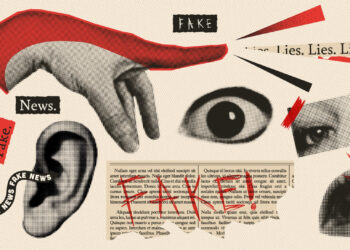
About ten or twelve years ago, I had my most frustrating experience ever with a publisher or vendor sales representative.
This rep was a guy who wanted to sell the library a subscription to a historical database of some kind — I honestly can’t remember which one — and he came to the library and made his pitch to me in my role as collection development officer. I told him the product he was selling was a good one, a database that we liked and would like to buy, but that our fiscal situation at the moment simply made it impossible. We didn’t have enough unencumbered and recurring money in our budget to take it on as a new subscription, and there was nothing we could cancel that wasn’t equally important or more important to our users. He pushed me for a while but finally took “no” for an answer.
Or so I thought. In reality, having not gotten to “yes” with me, he decided to go around me. He located some faculty members on campus who worked in disciplines relevant to the database, and pitched the product to them directly, urging them to put pressure on the library. Unsurprisingly, he found a much more receptive audience among those who would benefit directly from access to the database and who wouldn’t have to pay the invoice, and this led him to make a big mistake: a day or so after I had informed him that our library would not be purchasing this database, I got a call from the rep telling me that he would be back at the library that afternoon with several faculty members who were excited about the product, and that he needed me to reserve a room in which he could give them a demo. (Of course, he would need me to arrange A/V support as well.)
After I put plugs in my ears to contain the wisps of smoke that had begun leaking out of them, I met the rep and our faculty members in the presentation room. There I apologized on behalf of the rep to the faculty members whose time he was wasting, explaining to them that I had previously told him a purchase was out of the question at this time. After they left, I took him aside and explained (really quite calmly, I think) why his actions were inappropriate and how they had put me personally and the library as an organization in a bad light, and told him that he was no longer welcome in our library. When I got back to my office I called his boss and requested a new rep. (To the company’s credit, they apologized profusely and assigned us a new one immediately.)
Now, before I go further, I want to say that I’m anticipating multiple comments from publisher and vendor sales reps saying things along the lines of “The guy you’re describing is an outlier; no half-intelligent or competent sales rep would behave that way.” And I’ll acknowledge right up front that I believe this is true; I’ve worked with many, many sales reps over the past 25 years, and in my experience this guy was unique in his boneheadedness. I present his story not as a representative example of what it’s like to work with sales reps; I present it as an extreme example, but one that brings into sharp relief a very important question: should publishers, aggregators, and other content providers pitch their sales messages to the librarians who make final selection decisions, to the end users who will actually make use of the product, or to both of them in some combination?
The answer, I would like to suggest, is complicated. No surprise there, I guess.
The complexity of this issue arises from the awkward but unavoidable fact that when it comes to selling site licenses of content on a campus, the concept of “customer” is muddy. When you sell shoes, you can generally assume that the person who pays for them is also the person who will wear them. On a college campus, however, the entity that pays for the information product is not usually the entity that will make use of it, which puts sales reps in a tough situation. It’s not a unique situation, by any means — lots of reps sell to organizations that have procurement officers who buy things on behalf of others — but it’s still a tough one. How do you sell effectively when the buyer isn’t the user?
I would like to suggest two principles to apply when marketing and selling content to academic libraries.
First: Market to the user; sell to the buyer.
As marketers and sales reps know, there’s a big difference between marketing and selling. The difference may seem subtle at a conceptual level, but it’s significant in real-world practice. There’s nothing wrong at all with directing your marketing efforts towards the researchers, instructors, and students who will ultimately be your product’s end users. By all means, do whatever you can to make them aware of your product, to convince them of its quality and value, and even to encourage them to ask the library to buy it. Send them brochures, send them emails, provide them with easy-to-use request forms that they can send to the library, asking the library to consider a subscription. We in the library have no problem with that — we fully expect to be contacted by students and faculty with requests for new purchases or subscriptions. In fact, we encourage that kind of input, because we want to buy things that our students and faculty want and will use.
However, once you start talking to the person who is charged with buying stuff for the campus and trying to convince him to enact a purchasing decision, you’ve moved out of the realm of marketing and into the realm of sales. It will do you little good to sell to the end users in an institutional context where they are not the buyers.
This brings us to the second principle:
Second: Respect the decisionmaker.
When you’re selling content on a site-licensed basis to an academic institution, the decisionmaker is usually going to be a person or committee in the library. Where such is the case, and when a decision has been made, you probably shouldn’t try to undermine her position by looking for someone else who might be more likely give you the answer you want. If you bypass the buyer and take your sales efforts straight to the end users, you may well succeed at getting them excited about the product, and you may succeed at convincing them to put pressure on the library to buy it. But if the library has already told you that a purchase is out of the question, then taking your sales pitch to the end users is only going to result in frustration for everyone: for the faculty when the library tells them they can’t have the wonderful product you’ve convinced them they should have; for yourself when all of your strenuous efforts yield no result; for the librarian because you tried to undermine her in the job the campus expects her to do.
Of course, if you’re actually selling a product that might be purchased individually by faculty members, or that might be purchased for the campus by an entity other than the library (by the office of research, for example), then of course you should both market and sell directly to those entities — in such cases, those entities are both the end users and the buyers.
Corollary Principle: Respect Our Ambivalence about Trial Access
There’s maybe one more corollary principle I would suggest, and it’s related to the second one above: please be understanding when we in the library are hesitant to set up trial access. Trial access is designed to help us figure out whether our patrons would like and use the product in question. In many cases, however, we already know that the answer to that question is yes. And in some cases, the answer to the question is irrelevant because we’re not going to buy the product — not because we doubt its value or doubt that it will be used, but because we can’t afford it. Unfortunately, the number of high-value products that would get significant use is much greater than the resources available with which to buy them.
What this means is that we’re only likely to be open to the idea of a trial access period if the product in question is one we would be very likely to purchase if it gets heavy use. If there’s a relatively low likelihood of purchase regardless of the product’s popularity, then setting up trial access will do us and our end users more harm than good. You don’t give your child a pony on a 30-day trial basis to see whether she likes it unless you’re fully prepared to keep it if she does.
I don’t pretend that any of the above represents new or unique insight into the vendor-customer relationship, but these principles seem to me important to bear in mind. I would love to hear from readers about other principles that seem important to them as well (or who want to propose corrections to the way I’ve laid them out here).
Discussion
20 Thoughts on "Selling to Libraries vs. Selling to Users"
Something similar happened when Barnes & Noble wanted publishers to start using bar codes on their books. B&N CEO Steve Riggio went to make his case directly to some university presidents, bypassing university press directors. and that approach didn’t sit well with those of us who experienced it. I wrote to Riggio about this tactic, and he sent a cordial letter of apology. Of course it was a needed step in the evolution of the industry, so Riggio was right; but he could have adopted a better way of getting it implemented. Initially, it was book designers ate presses who resisted because they felt the ugly bar code detracted from the aesthetic beauty of their designs.
Timely, Rick. Digital content and newer models are melting walls between library as decision-maker and user as decision-maker. You drawn. Confusion has grown for many – all with budget targets to hit. You’ve provided excellent definition for us all. (The involvement of the ‘procurement office’ is a growing conundrum which may signal other things…).
Rick – an interesting corollary to this applies, I believe on the vendor side. Many, many years ago when I was a product manager at CLSI [remember them, a very early vendor of ILS systems – okay, I’m old!] and we were developing one of the first “discovery services” then known as OPAC’s, I was continually frustrated by requirements that were put in place by the buyers [librarians] when it was pretty clear to us based on user feedback [library patrons] that these features were not only not required, but often added un-necessary complexity to the user interface. I’m talking here about features like ensuring the bibliographic data displayed in a card catalog format and was optionally available as a full MARC record with tags, subfields, etc. Based on work I am currently involved in with libraries today, I believe there is a much greater understanding of and appreciation of end user requirements on the discovery side [maybe thanks primarily to Google]. But I do believe there is a clear role for librarians to work more closely with vendors of research related products and services [content included, but not exclusively content]. Such vendors/publishers/content providers often invest much more than an individual library can in direct contact with researchers and scholars through advisory groups, focus groups, user experience labs, etc. While the goals of librarians and vendors in such work can be quite different and sometimes conflicting, I find it sad when there is not more opportunity for collaboration which is not primarily a “sales pitch”.
Having been both a library administrator and LIS faculty member, I strongly concur with this observation. I have sometimes felt that some librarians have less knowledge about how faculty perform research than they think they do. I will also admit that my own research habits may be idiosyncratic since I often find the the simpler options work better for me than the complicated ones. On the other hand, the latest Ithika Faculty Survey (2015) reports that many faculty start the research process using Google Scholar (21%) or general search engines (11%). http://www.sr.ithaka.org/publications/ithaka-sr-us-faculty-survey-2015/
One of my columns in Against the Grain reported on my surprise at finding the answer that I needed much more quickly with Google than with rich array of traditional resources available to me from my academic library. Finally, I once entered a vendor contest in a science area that I knew nothing about by answering the questions correctly with the first page of Google results rather than from searching the vendor’s database.
I will agree that a scholarly paper will require finding more authoritative sources even if the initial lead comes from Google or Wikipedia.
Everybody has a role. The reps role is to sell, your role is to purchase what you can. The definition of a rep or salesperson is someone who is paid to hear no with an occasional yes. The rep tried an end run. You could have ended it by simply saying to the faculty that there was no money in the budget and the need for a meeting to hear what you had already heard was a waste of everyone’s time.
Lastly, everyone is a salesperson. You have to sell the library to the administration in order to be funded.
Not necessarily an outlier…we have had the same experience with some pushy vendors that don’t take no for an answer…
A similar situation exists with pharmaceutical companies, who send reps to doctors with drug samples (rather like textbook publishers) and also advertise directly to potential end-users. Prescription medicine may be an even more complicated example than publishing, but it’s parallel to the budgetary and governance situation many libraries are in.
I am only sorry that there is not a YouTube video of the conversation you had with the sales rep Rick as it would make for great entertainment. I completely understand the ambivalence regarding trial access and have heard that sentiment from many librarians for the reasons you cite. While I understand and respect this sentiment, it does cause some concern in that it makes it even harder for new products to enter the market (resulting in a sclerotic market defended by a few large and entrenched organizations) and may further result in resources valuable to the users not being considered. The faculty are also not able to lobby for funding for a new resource if they are not familiar with it.
While it is inappropriate and counterproductive for a publisher sales rep to go around the library, it is appropriate for the faculty to do so. If there is a resource that the facility thinks would greatly benefit their work, and the library does not have funds to purchase it, it is reasonable for the faculty to go to the provost (ideally with the knowledge and support of the library) and say “Hey, what about moving a bit of money from that bucket over there to this library bucket over here so we can buy this thing that will save us time and make our research better.”
The provost may very well say that there is no more money as it was all spent on a new trigger alert warning system, attorneys fees for the defense of the off-field activities of the lacrosse players, or the salary of the manager of the endowment. But it seems a conversation in certain cases worth having. University budgets are an exercise in lobbying. It is appropriate (and indeed necessary) for faculty to lobby for certain resources, whether they be departmental or purchased via the library.
Good points, Michael, and I agree — there’s nothing at all wrong with faculty going around the library to campus administration and requesting more money for the library. In fact, I think I can say that there’s nothing we librarians would appreciate more!
I also agree with you about the difficulty of the trial-access issue. It’s not a simple problem, and the concerns you raise are valid. We struggle with this in the library.
I think the faculty member as library budget advocate piece here is very important. I don’t care if vendors sell or market to my faculty. I think my purchasing role in the library has more to do with provisioning rather than deciding. By all means, pitch to my faculty, get them into my library for a product demo. And then let’s have the conversation about what the library can or can’t afford and why that is the case.
Of course the provost might also say that the money could be taken out of the university press’s subsidy!
Just a few weeks ago, a librarian at my institution watched a webinar offered by deGruyter about some product. DeGruyter then contacted one or more professors in the product’s subject area, and informed them that the librarian had watched a webinar on the product and suggested that they contact the librarian about acquiring the product. Needless to say, this sequence of events did not go down well in the library.
Rick, please,forgive this question, but do you exaggerate the role of librarian in this essay? I was once challenged by an engineering librarian at one of the best engineering schools in the US to debate pricing policies in front of the engineering faculty. I agreed, somewhat uncertainly. When I arrived, and we went to meet the faculty, I quickly became are that the faculty and librarian had never met before! The whole event was a shambles, and embarrassing for the librarian. Of course, different universities have different cultures, but it was patently evident that this particular librarian (a fine and intelligent human being, btw) had exaggerated his role in his own mind.
Hi, Jonathan —
Wow, embarrassing indeed. But in the context of this essay–which is about purchasing decisions more than about faculty relations–I don’t think I’m exaggerating the librarian’s role. In virtually all research libraries (and in most academic libraries generally), it’s librarians who make final decisions about the purchase of information resources that will be licensed for campus use. This is true regardless of whether those same librarians are doing a good job of knowing the faculty and being aware of their needs and concerns.
In many fields I think Rick is absolutely right. The library has the content money and makes the decision. However so products or services don’t fall under this pattern. Some of you may be familiar with the service Up to Date that was originally sold to medical libraries. Over time the product grew in popularity and the price was increased dramatically. Well the medical libraries started cancelling this service and within days of the cancellation, the sales person with considerable support from the medical faculty contacted the Deans of the medical school who quickly found money for the product. To date I don’t know of a single cancellation of this service. The wave of library cancellations were all reinstated and subscriptions continue to this day. On many campuses the Dean of the medical school found a way to claw back most of the money from the research library……and payback was often not pleasant.
I can give you one example of Up-to-Date being cancelled, as it has happened at the institution where I work. When prices went up, we went from online access to single-workstation online access to quarterly CD access and ultimately to cancellation. Even when we had it, especially once it dropped to quarterly updating, we often tried to steer our users (faculty and students alike) to resources which truly were more up to date than the product which was so named.
I have seen the bypass-the-librarian many times in the last 20 years. It is rarely successful. I’ve even seen angry letters to the president, various vice presidents, etc. “Your peers license ____, yet you do not.” Vendor rep’s new favorite target is CIO’s and Learning Management System leaders which may work better for them now that things like streaming video collections sit in a grey area. Is it more like a textbook collection? or a library collection? “is your LMS getting boring? add a streaming video collection to add a punch!” We are getting tons of forwarded vendor emails from folks in Enterprise IT Services.
On the flip side, many faculty, often for personal non-work reasons, request trials to products and surprisingly, vendors oblige. Then I get a call, “John Smith trialed ____ and is ready for the library to license ____. What is your FTE?” After I finish laughing, I get them to ban non-authorized trials. Sometimes it works, often it does not hold for longer than the next newbie rep. is hired.
Hi Rick, From a subject/faculty/liaison perspective, I’d like to say “really nice post – thank-you”. I’m not sure that your experience is necessarily related to an outlier. I have had a number of similar experiences over the last few years & I am a librarian in a small non-US university. I think that it’s also important for sales representatives to consider the reputation of the subject/faculty/liaison librarians with whom academics work. If we are doing our jobs well, we *will* have a reputation for working in very effective client-centred partnerships with our academic clients and, when our academic clients are “messed around” in these types of incidents, it is not the librarian who looks bad. We will inevitably handle the incident with a professional approach (as you did) as our clients expect, and they will accept our explanation (even if they hope that, one day, we can afford the subscription & they continue to lobby for it). The good librarian just ends up looking even better. Being a salesperson must be an incredibly difficult job (especially in tight financial environments) & not one that I would do well, but reputation is important to everyone in these situations & once lost …
I recently had a sales rep show up uninvited after I didn’t respond to his request for a meeting. When I told him I couldn’t speak with him, he proceeded to ride the elevator up and down the building trying to get meetings with the VPs and President of the institution. He lied to our security officers and said he had an appointment with me to get into the building, which made it look like I was responsible for his presence. It made both myself and security look incompetent and we were all approached by the President. I called the rep’s boss, who apologized profusely and assured me that was not the way they do things and he won’t be back. I’m sure he realized there wasn’t a snowball’s chance in hell we’d make a purchase from them at this point.
The flip side of this is that librarians should not overstate their responsiveness to faculty wishes. Our librarian assured us that if our academic department wanted to make cost-neutral changes to the journals in our field that were subscribed to by the library, we were free to do so. We spent many, many man-hours carefully analyzing alternative subscriptions and submitted our changes to the library, whereupon they simply ignored our request and signed up for a Big Deal instead. Thanks for nothing, guys!



